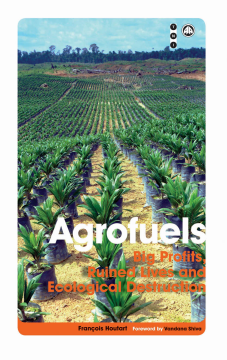
Additional Information
Book Details
Abstract
Agrofuels were heralded as a key weapon in the fight against climate change, but the deforestation and theft of agricultural land that was essential to farmers in the developing world, suggests that they are doing more harm than good.
Francois Houtart argues that the green potential of agrofuels has been hijacked by businesses that put profits above environmental protection. This has led to the absurd situation where an energy source that should be sustainable actually increases human and ecological damage, simply due to the profit-maximising decisions of capitalists rather than a flaw in the concept of agrofuels.
Houtart reveals that we need to rethink neoliberalism's relationship to green politics and ask is capitalism compatible with climate change, or do we need to overhaul our economic system in order to save the planet?
'That solutions can be the causes of problems is well known and brilliantly illustrated by François Houtart's account of the nature, role and impact of agrofuels. Technically sound, socially thorough and politically grounded, it is also compassionate'
Susan George, Honorary President of ATTAC-France and President of the Board of the Transnational Institute
'A unique and important contribution to the debate on agrofuels. Vital reading for all those interested not only in the question of agrofuels, but also in the direction of our civilisation and its shameful waste of natural resources'
Professor Olivier De Schutter, UN Special Rapporteur on the right to food
'Presents the issue of agrofuels within the global context of the capitalist economy, stressing the role played by the oligopolies in promoting 'green energy'. This is the best book so far written on the subject'
Samir Amin, Director of the Third World Forum in Dakar
Table of Contents
| Section Title | Page | Action | Price |
|---|---|---|---|
| Cover | Cover | ||
| Contents | v | ||
| Foreword | vii | ||
| Preface | ix | ||
| 1. Energy and Development | 1 | ||
| Exploiting Nature as a Source of Energy | 1 | ||
| Energy in the Development Model | 5 | ||
| Energy’s Role in the Growth of Capitalism | 7 | ||
| The Social and Ecological Effects of the Capitalist Development Model | 12 | ||
| 2. The Twin Crises: Energy and Climate | 18 | ||
| The Energy Crisis and Non-renewable Energy Sources | 18 | ||
| The Climate Crisis or Global Warming | 26 | ||
| 3. The Neoliberal Discourse on Climate Change | 56 | ||
| First Stage: Denying or Playing Down Climate Change | 56 | ||
| Second Stage: Promoting Market-friendly Solutions | 60 | ||
| Problems with the Neoliberal Approach | 72 | ||
| 4. Agrofuels and Agroenergy | 75 | ||
| Characteristics of Agrofuels | 75 | ||
| The Different Types of Agroenergy | 77 | ||
| 5. Ethanol Production | 82 | ||
| FROM SUGAR CANE | 82 | ||
| In Brazil | 82 | ||
| In Other Countries of the South | 88 | ||
| In the Countries of the North | 89 | ||
| 6. Agrodiesel Production | 91 | ||
| FROM PALM OIL | 91 | ||
| Origins and Characteristics | 91 | ||
| Contemporary Production | 92 | ||
| Personal Testimony from Colombia | 96 | ||
| FROM JATROPHA CURCAS | 108 | ||
| Origins and Characteristics | 108 | ||
| Contemporary Production Programmes in Asia and Africa | 109 | ||
| Plants Similar to Jatropha Curcas | 113 | ||
| 7. The Collateral Effects of Agrofuels | 115 | ||
| The Ecological Effects of Agrofuels | 115 | ||
| The Social Effects of Agrofuels | 118 | ||
| 8. The Socio-economic Dimensions of Agroenergy | 122 | ||
| The Agricultural Model Underlying Agrofuels | 122 | ||
| Economic and Financial Issues of Agrofuels | 129 | ||
| Agrofuels and the Food Crisis | 136 | ||
| Agrofuels and the Reproduction of Capital | 139 | ||
| Agrofuels and the Development Model | 147 | ||
| 9. Alternative Ways of Solving the Climate and Energy Crises and the Role of Agrofuels | 152 | ||
| Solutions Envisaged and their Limitations | 152 | ||
| Post-capitalist Logic of the Economy and a New Development Model | 166 | ||
| Glossary | 173 | ||
| Notes | 178 | ||
| Index | 185 |
